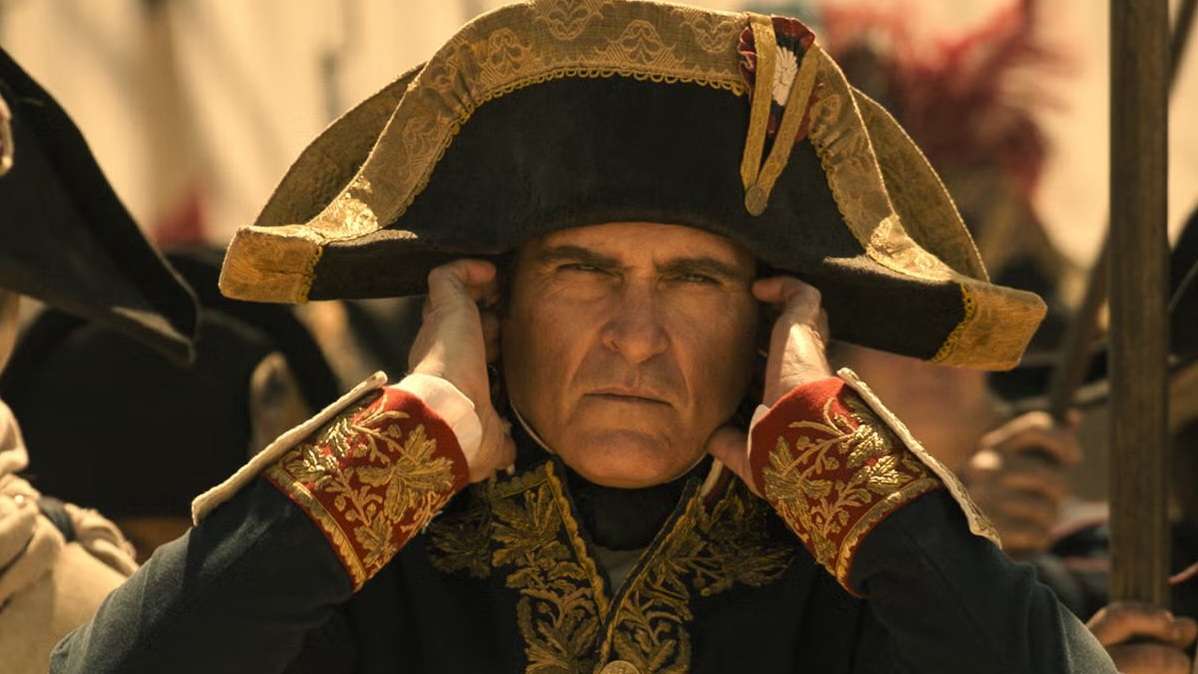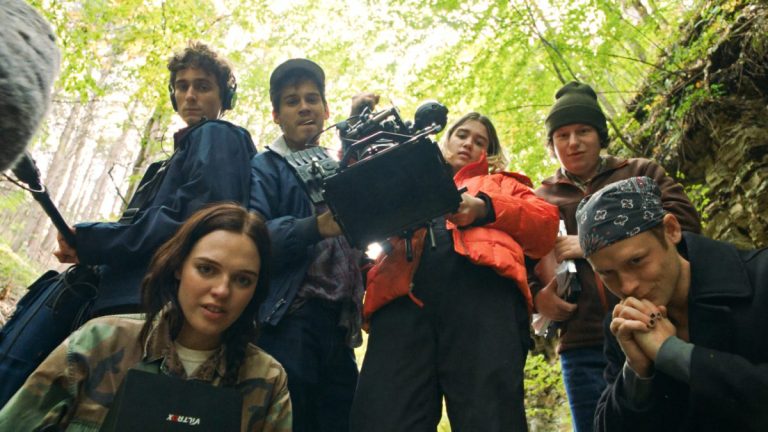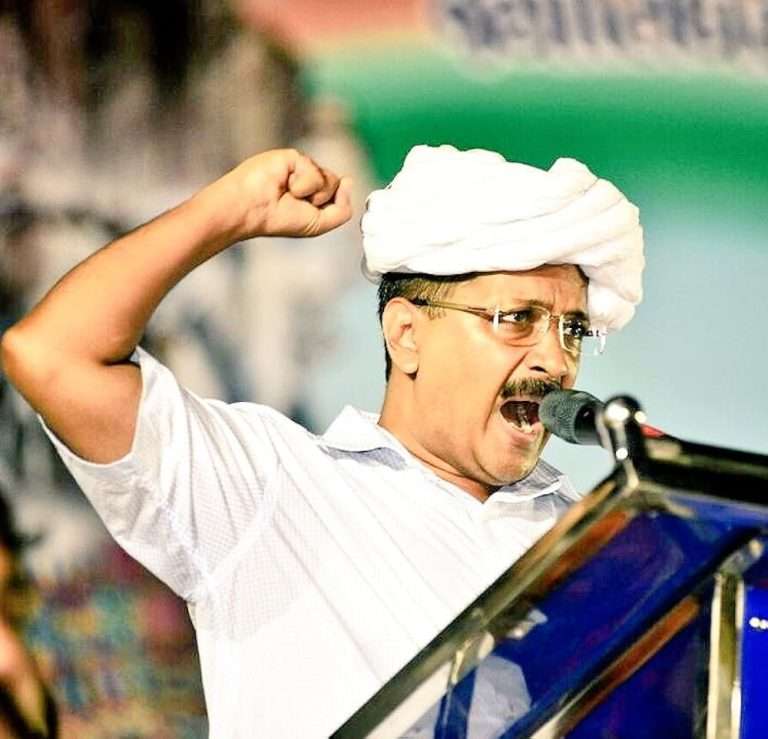Napoleon (2023) Movie Review: Ridley Scott’s last historical drama, “The Last Duel,” was released in 2021, and it ended up grossing just over $30 million worldwide. The last decade, in general, has seen a rapid fall in mid-budget historical epics, most of which have been secondary to the subject matter being exploited in the long-form storytelling avenues. Why would studios risk backing expensive films that can instead use the full-fledged potential of their large-scale stories in the episodic landscape?
Scott, who turns 86 this month, has always been particularly interested in battles; his films often paint visceral worlds around the Great Men of History (or even aliens and androids, for that matter). With his most accomplished outings, he’s carved out riveting practical as well as psychological portraits out of these worlds. That’s precisely why most of his films earn quite a lot of critical acclaim. Whether you like his movies (or his totally unhinged, growly side in interviews) or not, Scott makes the kind of films we simply don’t get to see anymore.
In his latest $200 million period drama, we are introduced to Napoleon (Joaquin Phoenix) as a passive observer in the crowd at Marie Antoinette’s execution. Right after that, we jump into following the emperor’s story roughly through three decades of his active life. We get a series of battles that would fuel the man’s rise from a lowly soldier judged for his Corsican origins to becoming one of the greatest generals the world would ever see. But the connecting link here, curiously enough, becomes his relationship with Empress Joséphine (Vanessa Kirby).
Right after we watch Napoleon make a triumphant return to Paris, we get his introductory scene with his future empress. As she hikes up her dress to show him “a secret” that he will never be able to keep away from, you instantly sense the shift in the power dynamics emerge. It’s from this point where Napoleon’s outsized ambitions turn into a laughing stock.
What’s more embarrassing than losing on the battlefield, you wonder? Scott’s interpretation of the man makes you forget about the kind of expectations you take along into a historical drama of this scope and scale. In fact, the scope here is reduced to following just another loser as he goes on for one after another war over what he lacked in life and ultimately dies with nothing else for company. It’s the internalization of this looming embarrassment that makes him “bent on peace at any cost,” but the kind of which can only be arbitrated between his id and superego.
The tone for a story as epic in scope as that of Napoleon’s would ultimately depend on the kind of relationship a filmmaker would share with the subject matter. Scott has always been interested in mocking the infinite triviality of man’s lust for power. Here, he casts an actor who’s basically perfected playing narcissistic and insecure men on screen. As a director, he’s often been heavy-handed with his themes – but that’s precisely why his films work (well, at least the good ones). David Scarpa’s dry script here, however, doesn’t always fall in tune with the depiction of the psychosexual nature of the couple’s freakish relationship. The result is an uneven film that never really transcends from screen to psyche.
Perhaps that’s what makes the historical inaccuracies in the movie stand out. It’s not that watching Scott utterly humiliate one of history’s most ambitious rulers is off-putting. At the center of this portrait lies the deeply relevant theme of pervasive nationalism. But the film never really mulls over the casualties born of his violent conquests. Dariusz Wolski’s cinematography paints an enveloping showcase of topographically distinct battlefields, reiterating the sweeping nature of Napoleon’s conquest. A couple of shots where blood mixes with the snow underneath the icy expanse of Russia particularly prompts Napoleon’s slide into a chilling defeat. But the narrative never ruminates over the human cost that one man’s egotism led to until its final closing text.
Also, Read The Killer (2023) Review
Clocking in at almost 160 minutes, “Napoleon” packs in a lot in its runtime. It’s the kind of film that at once feels too long and too concise for the subject it chooses. Unsurprisingly, Scott has a longer version closer to over four hours ready for release sometime later this year on Apple TV+. Adamant film buffs would argue how the director’s cut would be better at posing the film’s thematics in a coherent way, as is often the case. And once again, the merits around the sensibilities and logistics of making and viewing a historical epic on the big screen would be left to debate. For now, it’s come to us as an excuse to celebrate the filmmaking spirit of one of the gnarliest yet artistically accomplished voices of our times.
★★★
Napolean Movie Information
External Links: Rotten Tomatoes, Wikipedia
Rating: R (Sexual Content|Brief Language|Some Grisly Images|Strong Violence)
Cast: Joaquin Phoenix, Vanessa Kirby, Tahar Rahim
Genre: Biography, History, Drama, War, Action
Original Language: English
Director: Ridley Scott
Producer: Mark Huffam, Ridley Scott, Kevin J. Walsh
Writer: David Scarpa
Runtime: 2h 38m


![The Edge of Seventeen [2016] Review : Warmly Intimate and Utterly Lovable](https://79468c92.delivery.rocketcdn.me/wp-content/uploads/2017/02/edgeof17header.jpg)




![Columbus [2017] – A Soulful Tribute to Human Connection and Architecture](https://79468c92.delivery.rocketcdn.me/wp-content/uploads/2017/11/cover-1-768x432.jpg)